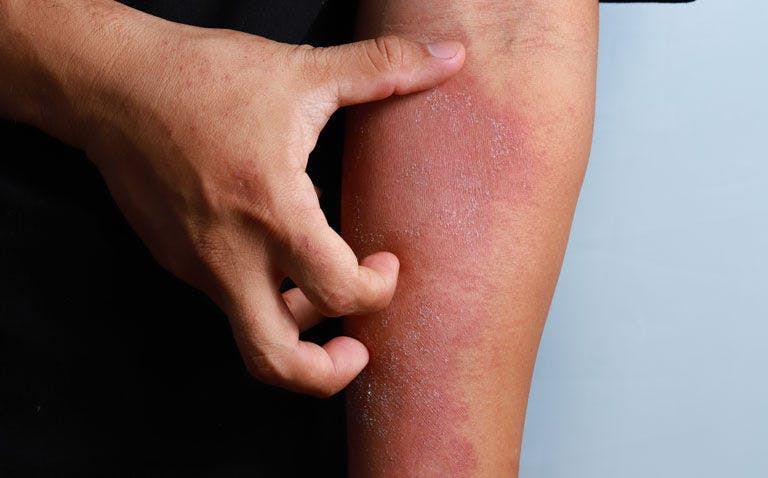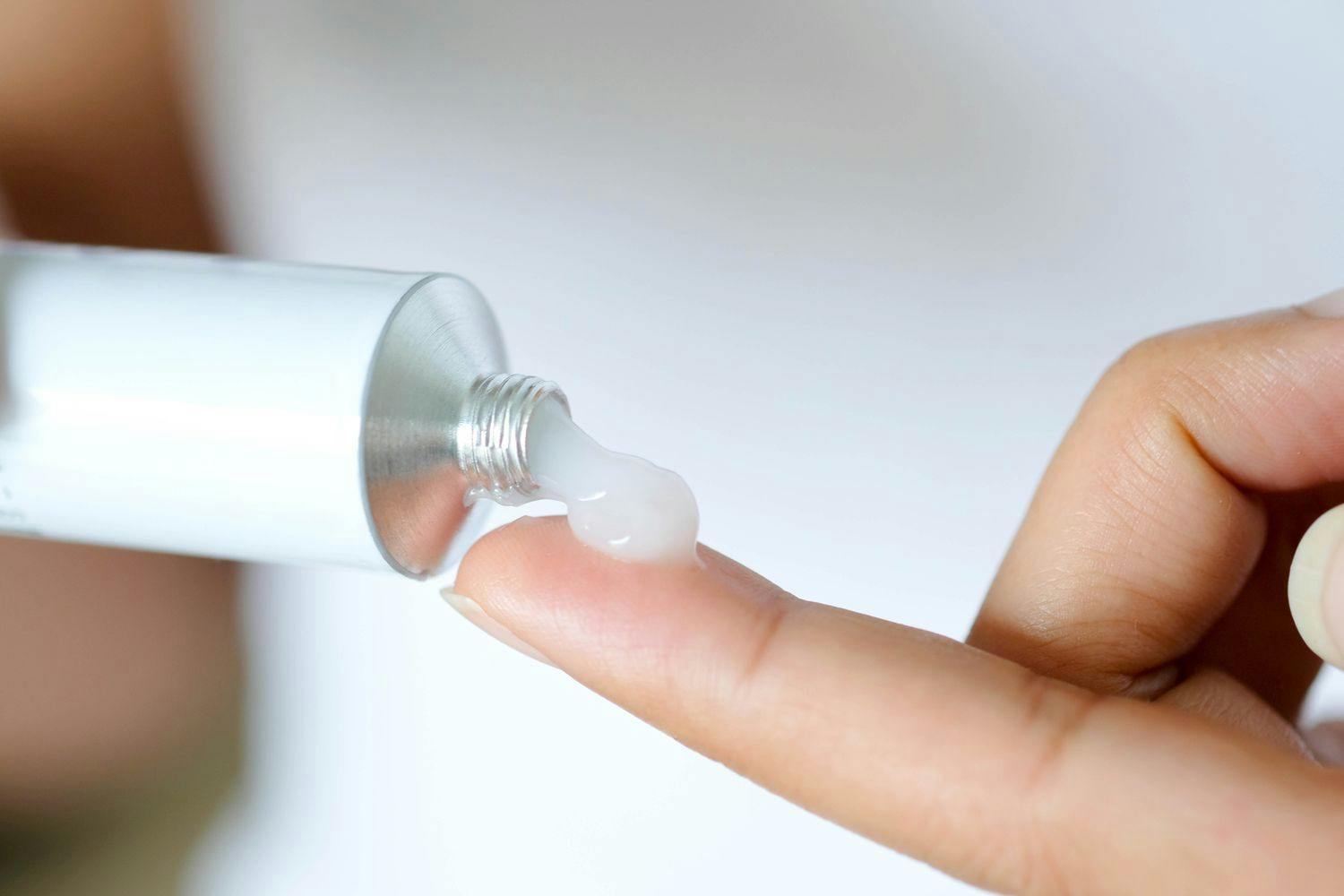Understanding Atopic Eczema: From Causes to Treatments
Written and fact-checked by Alessandro Grenci, Superintendent Pharmacist. Read our editorial policy to see how we create informative, accurate content.
What is Atopic Eczema?
Atopic Eczema, also known as Atopic Dermatitis, is a chronic skin condition mainly affecting children, but it doesn’t discriminate by age. Characterized by itchy, red, and dry skin patches, it can sometimes culminate in skin infections.
Relation to Other Skin Disorders and Allergies
Eczema doesn't usually come alone:
- Individuals with Atopic Eczema often have a heightened risk of developing other allergic conditions, such as hay fever or asthma.
- There's an inherent susceptibility to skin infections among those with Atopic Eczema.
- It may be associated with other skin disorders, underscoring the importance of proper diagnosis for tailored treatment.
Causes of Atopic Eczema
Atopic Eczema is one of those conditions that can leave people scratching their heads (pun intended!) about its root causes. From your genes to the world around you, various factors contribute to its onset. Let's dive deep and explore these contributors.
Genetics: It's in Your DNA
Ever heard the phrase, "It runs in the family?" For many with Atopic Eczema, this couldn't be truer. If your parents or siblings have eczema, there's a chance you might develop it too. Your genetic code can predispose you to have an over-sensitive skin response. Our genes are like recipes, and sometimes the mix can make skin more prone to inflammation.
Environmental Factors: It's Not Just You, It's the World Around You
From the soap you use to the pollen in the air, environmental irritants play a significant role in triggering Atopic Eczema. Some common culprits include:
- Dust mites
- Pollens
- Pet dander
- Certain fabrics like wool
- Harsh soaps and detergents
Understanding these can help manage and possibly prevent flare-ups.
Immune System Abnormalities: When Defense Turns Offensive
Our immune system is like our body's security system, but in Atopic Eczema, it can sometimes overreact. Instead of just fending off harmful invaders, it reacts vigorously to minor irritants, leading to inflammation and the typical eczema rash.
Skin Barrier Defects: Not Just Skin Deep
Your skin is more than just a covering; it's a protective barrier. In Atopic Eczema, this barrier can become compromised, making it easier for irritants to enter and moisture to escape. This can lead to:
- Dry skin
- Increased sensitivity to irritants
- Greater risk of infections
Symptoms of Atopic Eczema
Atopic Eczema can manifest in a myriad of ways, but some symptoms are more prevalent than others. Here's what you might notice:
- Intense itching that might worsen at night
- Red to brownish-gray patches, especially on the hands, feet, ankles, wrists, neck, upper chest, eyelids, and inside the bend of the elbows and knees
- Small, raised bumps which might leak fluid and crust over when scratched
- Thickened, cracked, or scaly skin
- Raw, sensitive, or swollen skin from scratching

These signs can offer crucial insights into how the skin reacts and evolves with this condition.
Symptoms Variation by Age and Severity
Now, here's the catch: Atopic Eczema doesn’t play out the same for everyone. The symptoms and their intensity can differ based on one's age. For instance:
- Infants might have rashes on their cheeks and scalps which can bubble up before leaking fluid.
- Young children, between 2 years to puberty, may experience rashes behind the creases of elbows or knees.
- Adults, on the other hand, might see rashes on the back of the neck or a chronic hand eczema. Some adults might even experience Atopic Eczema symptoms for the first time.It's also worth noting that flare-ups can range from mild to severe, making regular monitoring essential.
Emotional and Psychological Impacts
Beyond the skin's surface, Atopic Eczema has a knack for reaching the mind. The incessant itching and visible symptoms can take a toll on one's mental well-being. Research suggests that people with Atopic Eczema can experience:
- Increased levels of anxiety or depression
- A sense of isolation, especially in severe cases
- Sleep disturbances due to nighttime itching
Understanding these deeper ramifications underscores the importance of a holistic approach to managing Atopic Eczema.
Diagnosis of Atopic Eczema
Understanding how this skin condition is diagnosed can be both intriguing and crucial. Recognizing Atopic Eczema isn’t just about spotting a rash; it's about piecing together a puzzle of symptoms, history, and physical evidence.
How Doctors Diagnose Atopic Eczema
When symptoms emerge, doctors don't possess a magical tool to immediately pinpoint Atopic Eczema. Instead, the process is a blend of:
- Engaging patients in detailed interviews about the symptoms' onset, pattern, and possible triggers.
- Conducting a meticulous skin examination to spot the distinct signs of Atopic Eczema.
- In some cases, utilizing specific tests to rule out other potential skin conditions.
These layers of evaluation guide physicians in understanding and confirming the presence of Atopic Eczema.
The Value of Medical History and Physical Examination
Your story matters. In the context of Atopic Eczema, the stories of past flare-ups, previous treatments, or even familial patterns can provide invaluable insights. Information like:
- Prior flare-up occurrences and their triggers.
- The intensity and duration of symptoms.
- Any family predisposition to eczema or related conditions.
Alongside this, a hands-on physical examination allows the physician to observe and feel the characteristic features of Atopic Eczema. This combination of history and examination constructs a clearer, comprehensive picture of the situation.
Differential Diagnoses: Meeting Atopic Eczema's Lookalikes
One of the challenges in diagnosing Atopic Eczema lies in its doppelgangers—other conditions that mimic its appearance. These include:
- Psoriasis
- Other types of dermatitis (e.g., Contact and seborrheic dermatitis)
- ScabiesDoctors often carry out a set of tests or ask specific questions to make sure they can tell Atopic Eczema apart from other conditions that look much the same.
Treatment and Management of Atopic Eczema
Navigating the world of Eczema treatments can sometimes feel like a maze. But fear not! We're here to illuminate the path. Let's journey through the treatment options available and see how they aim to provide relief and prevent those pesky flare-ups.
Goal of Treatment
Before diving into specific treatments, it's essential to understand the overarching goal. In the vast landscape of Eczema, the twin lighthouses that guide our therapeutic journey are:
- Symptom relief: Making those itchy, angry patches more manageable.
- Preventing flare-ups: removing triggers and maintaining a skincare routine to prevent reoccurrence.
Topical Treatments
At the frontline of Atopic Eczema management are topical treatments—medications you apply directly to the skin. These include:
- Steroid creams and ointments that reduce inflammation and itching.
- Non-steroidal creams, like calcineurin inhibitors, that play a similar role in managing inflammation without the side-effects tied to steroids.
- Topical PDE4 inhibitors which can help reduce inflammation.
- Emollients or moisturizers that help keep the skin hydrated and build a protective barrier.
All these treatments aim to offer relief from the symptoms and can play a pivotal role in the daily management of Atopic Eczema.

Systemic Medications
In cases where Atopic Eczema is stubborn or widespread, doctors might prescribe systemic treatments. These are medications that work throughout the body. Some commonly prescribed include:
- Oral corticosteroids, like prednisolone.
- Immunosuppressant drugs, like cyclosporine, methotrexate, or mycophenolate mofetil.
- Biologic drugs targeting specific parts of the immune system, such as dupilumab.These medications can offer a broader and potent approach to managing severe Eczema symptoms.
Light Therapy
Another tool in the therapeutic arsenal against Atopic Eczema is light therapy. By exposing the skin to controlled amounts of natural or artificial ultraviolet light, light therapy can help reduce itching, increase vitamin D production, and calm inflammation.
Holistic Approach
Remember, Atopic Eczema doesn't just affect the skin. It's a condition that has ripples in the pond of emotional, psychological, and physical well-being. Thus, a holistic approach—melding medical treatments with supportive therapies, counselling, and a patient-centric care approach—is the way forward.
Emphasis on the Availability of Treatments and the Importance of Consulting with a Dermatologist
Let's dispel a common myth: Atopic Eczema doesn't have a one-size-fits-all solution. While some treatments might work wonders for one person, they might not be as effective for another. That’s why it’s paramount to remember:
- There are multiple treatments available, ranging from creams and ointments to more advanced therapies.
- Individual needs vary, and what suits one person might not necessarily suit another.
- Identifying the condition at an early stage and implementing timely measures can substantially impact its management.
If you’re pondering over these treatments, a dermatologist is your go-to person. They’re equipped not just with the knowledge but also with experience in tailoring treatments to individual needs. While there might be a plethora of advice floating around, a consultation with a dermatologist ensures you receive expert guidance tailored to your specific situation.
Your tailored treatment here at Medino!
Once you've been diagnosed with Atopic Eczema, getting your treatment shouldn't be another hurdle. That's where we come in. As a leading online pharmacy, we pride ourselves on providing a seamless and swift solution for all your medicinal needs. Why wait for an appointment with a GP or waste time in queues when we offer prompt delivery of prescribed treatments right to your doorstep? Explore our range of quality products tailored for atopic dermatitis.
The Power of Betamethasone in Atopic Eczema Treatment
Betamethasone stands as a key component in our treatment lineup. This is a type of medicine known as a topical corticosteroid which works as an antinflammatory. Such inflammatory responses might be caused by allergens or irritants, triggering symptoms like redness, swelling, itching, and discomfort seen in Atopic Eczema. Within skin cells, Betamethasone inhibits the release of agents that cause inflammation, thereby alleviating the linked symptoms.
Discover the variety of treatments we offer containing Betamethasone:
- Audavate RD - Betamethasone 0.025% Cream: A moderately potent topical steroid suitable for treating both the face and flexures as well as other sensitive areas of the body for a limited duration. This cream is especially optimal for moist or weeping lesions, delivering targeted relief from inflammation and itching.
- Betnovate RD - Betamethasone 0.025% Cream: This moderately potent topical steroid can also be safely applied to the face and other sensitive areas for short periods. Being a cream, it is perfect for those moist and weeping eczema flare-ups.
- Betnovate RD - Betamethasone 0.025% Ointment: With the same moderate potency, this ointment is best suited for dry and scaly lesions, nourishing and healing the skin in depth.
- Betnovate - Betamethasone 0.1% Cream: This is a potent topical steroid, reserved for severe cases of eczema when milder or moderately potent steroids have proven ineffective.
- Betacap Scalp Application (PGD): Created with scalp-specific concerns in mind, this product combats itching and inflammation right at the roots.
- Betnovate Scalp Application (PGD): Another potent scalp treatment that ensures maximum comfort and relief.
- Betnovate Lotion: A lightweight, liquid formula ensuring swift relief from atopic eczema symptoms in areas difficult to treat with a thicker form due to hair or larger surface area.
At Medino, our commitment is to ensure that your journey to relief and recovery is as smooth and straightforward as possible. We understand the distress and discomfort eczema can bring, which is why we meticulously select treatments that are both effective and trustworthy. With Betamethasone as a proven option in our arsenal, we aim to provide you with the best in atopic eczema care. Should you have any questions or require further guidance, our dedicated team is always here to assist. Thank you for choosing Medino as your trusted partner in health.
Sources
American Family Physician - Atopic Dermatitis: Diagnosis and Treatment
EverydayHealth - Questions about Atopic Dermatitis
Healthline - Overview of Atopic Dermatitis
National Eczema Association - What is Eczema
National Eczema Association - Behind the Atopic March
National Library of Medicine - Atopic Dermatitis
National Library of Medicine - Atopic and non-atopic eczema
National Library of Medicine - Atopic Dermatitis: Natural History, Diagnosis, and Treatment
Yale Medicine - Eczema, Atopic Dermatitis

